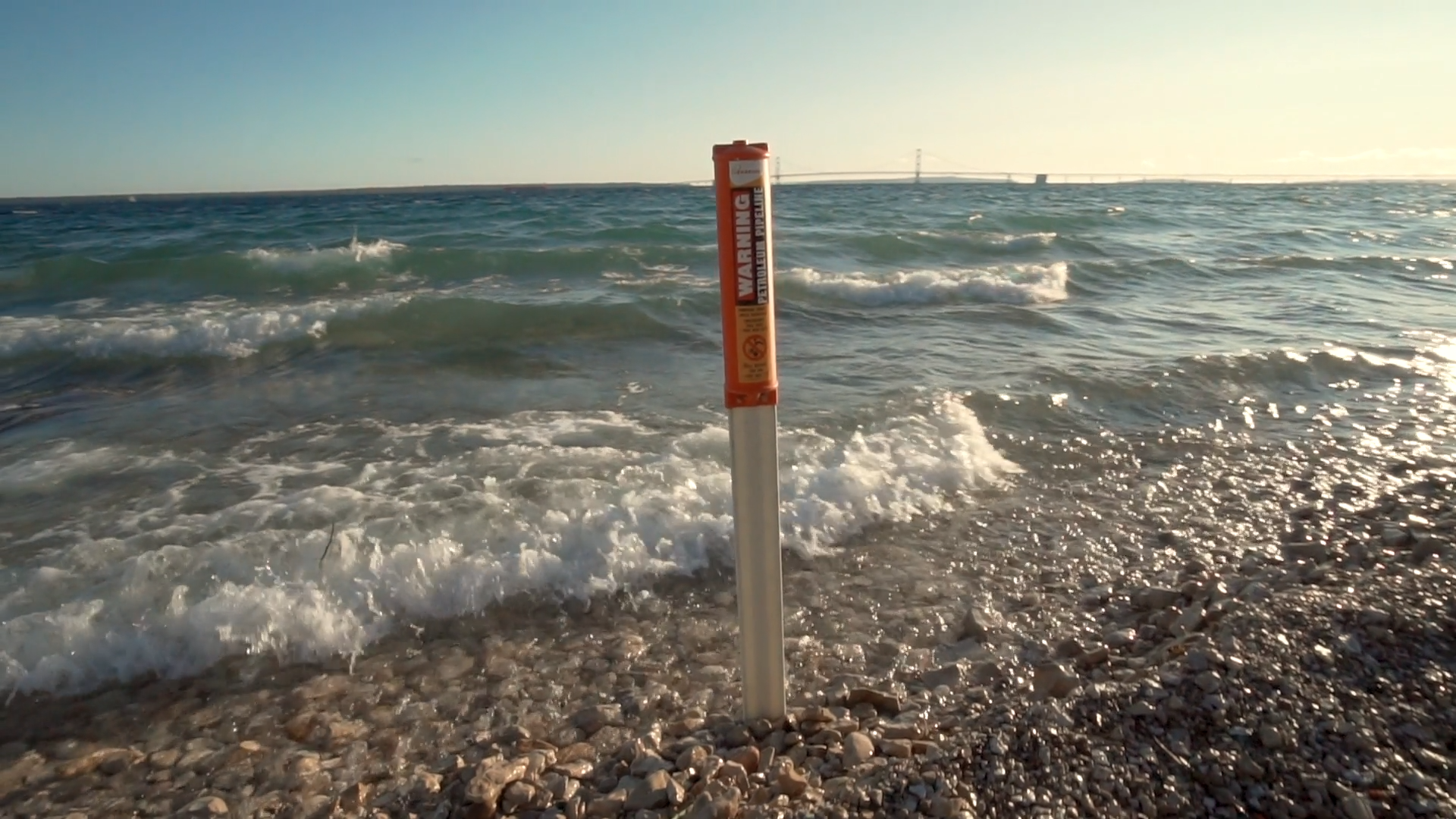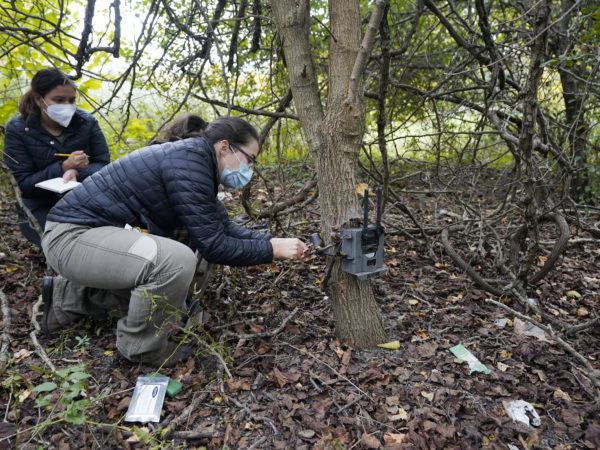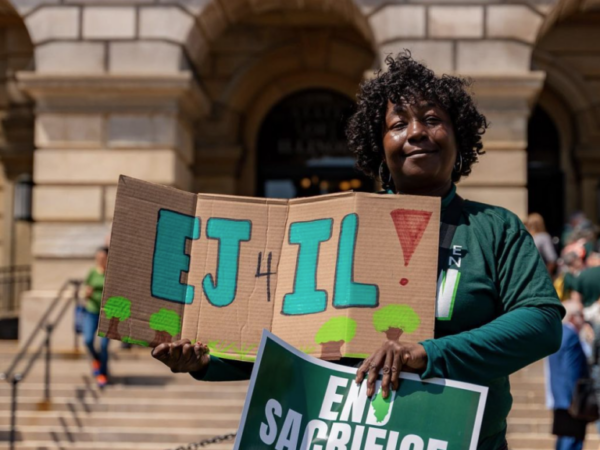
By Izzy Ross, Interlochen Public Radio
This coverage is made possible through a partnership with IPR and Grist, a nonprofit independent media organization dedicated to telling stories of climate solutions and a just future.
Twelve miles of the Line 5 pipeline cross the lands of the Bad River Band of Lake Superior Chippewa in northern Wisconsin.
In some places, the pipeline is just feet from the banks of the Bad River. The river meanders, and severe flooding eroded its banks last spring, prompting the tribe to call for an emergency shutdown of the pipeline.
A federal judge ordered Enbridge to do so by June 2026, and to pay the tribe over $5 million. But the tribe and the company both appealed, with the tribe saying it was too little money and too long a timeline.
If the court rules in favor of the company, tribes and legal experts say it could have major implications for tribal sovereignty.
Bad River lawsuit
Enbridge’s easements for the pipeline expired in 2013. In 2017, the Bad River Tribal Council voted not to renew them, and called for the removal of Line 5 from its lands.
The Bad River Band sued Enbridge in 2019, saying it was trespassing and that the pipeline was at risk of rupture, posing an imminent threat to the watershed and threatening sources of food and water, as well as their ways of life.
In the fall of 2022, U.S. District Judge William Conley agreed that Enbridge was trespassing. But he didn’t order a shutdown, referring to economic concerns and the implications doing so would have on public policy and trade between the U.S. and Canada.
Then came the 2023 ruling and the appeals.
On Feb. 8, a three-judge panel heard oral arguments in the 7th Circuit Court of Appeals in Chicago.
The Bad River Band wants Enbridge to cease operations before the spring flooding season and remove the pipeline from the reservation.
Enbridge has argued that it’s not trespassing, that it needs more time to move the pipeline outside of the reservation before shutting down that section, and that the court’s decision would not be in the public interest.
Enbridge and the Government of Canada say shutting down the pipeline before relocating it would also violate a 1977 treaty between the U.S. and Canada.
But missing from that discussion in court last month was input from the U.S. government, something one judge on the panel called “extraordinary.”
Transit treaty
Under the 1977 transit treaty, the U.S. and Canada agreed to allow for uninterrupted transport of hydrocarbons — like oil and natural gas liquids — between the two countries. The treaty is rarely used in pipeline cases, and invoking it may mean confidential hearings between Canada and the U.S.
Enbridge and Canada argue that it “prohibits public authorities from permanently shutting down transit pipelines,” and that Line 5 cannot be shut down on the tribe’s lands before a reroute is complete.
Tribes across the Great Lakes are asking the federal government to weigh in on this case — among them, the Bay Mills Indian Community, the Little Traverse Bay Bands of Odawa Indians and the Grand Traverse Band of Ottawa and Chippewa Indians.
In a letter to the Biden administration, representatives from 30 tribal nations across Michigan, Minnesota and Wisconsin say this has serious implications for tribal sovereignty and the transition away from fossil fuels, and they urge the administration to show where it stands.
“If the United States doesn’t weigh in, what they are risking is that states, tribes, and even the federal government could be subject to trespass by a corporation for the rest of time,” said Whitney Gravelle, president of the Bay Mills Indian Community in Michigan’s Upper Peninsula.
“Whatever decision this court makes will have an impact not only on the Bad River Band, but also on every single tribal nation in the United States,” she said. “And the determinations made will either continue to support tribal sovereignty, or it will undercut tribal sovereignty and allow foreign corporations to trespass on tribal land without any ramifications.”
Appeal arguments
The Bad River Band pushes back against Enbridge’s reading of the 1977 transit treaty in its appeal.
Among its arguments, the tribe cites its 1854 treaty with the U.S. that recognizes its right to exercise sovereign authority over its lands, such as excluding non-Indian people.
And the tribe says that even if the 1977 treaty applies, it still allows for pipelines to be regulated, including for pipeline safety and environmental protection.
Enbridge maintains that shutting down the pipeline before it’s rerouted would not be in the public interest.
“The district court shutdown order in this case will cause a massive disruption in energy supplies and economies in the Midwest and Canada,” said Enbridge attorney Alice Loughran during oral arguments last month.
Loughran said the pipeline section in question is less than half a percent of the total length of Line 5.
The company declined IPR’s request for an interview.
Enbridge also argues that the tribe is not following a 1992 agreement; the company says it’s not trespassing, as the agreement allows it to continue operating there until 2043.
The band’s attorneys have pointed to emails from 2016 and 2017 between Enbridge employees, made public during trial, that acknowledge the trespass.
Where to go?
Enbridge’s proposed reroute of the pipeline, skirting around the reservation, is another point of contention.
Enbridge said in a statement that it doesn’t intend to be on the Bad River Reservation “for a moment longer than it takes to relocate the segment of Line 5 around the reservation.” Attorneys have said they’re waiting for the federal permits to do so.
The company has asked the tribe to mitigate erosion of the riverbanks near the pipeline in the meantime, which the tribe has yet to do.
In an open letter to the Bad River Band published in January, Enbridge asked the tribal council to engage with the company directly on mitigation efforts.
“We have done our best to explain the urgency and seriousness of addressing this issue, yet in December, Enbridge’s latest proposal to reinforce the riverbank using trees was denied based on inaccurate and incomplete information,” the company wrote.
In court, the tribe’s attorney said it didn’t want to take actions that could impact the environment when it’s the responsibility of Enbridge to remove the pipeline.
In another open letter posted this month, the company says it’s offering the tribe $80 million in compensation to end litigation and cooperate on relocating the pipeline.
The Bad River Band has opposed the reroute Enbridge has proposed, saying it still threatens their watershed.
“It’s a band-aid for an aging pipeline,” said Stefanie Tsosie, an Earthjustice attorney who has represented the tribe. “The risk of an oil spill will still exist in the Bad River watershed. And instead of moving it out of the watershed, [Enbridge moves] it upstream of the reservation. So now the entire reservation would be subject to an oil spill.”
Where are the feds?
In all of this, the federal government has been unusually quiet.
In December, the court asked the Biden administration to weigh in on the case. A day before oral arguments last month, the administration finally submitted a one-page notice saying they needed an additional 30 days.
“It really is extraordinary, in a way, that the United States and all of its agencies, collectively, have maintained silence about this,” said Judge Frank Easterbrook, speaking to Enbridge’s attorney during oral arguments. “We’ve asked them to break their silence.”
Any input from the federal government will likely hold sway, said Native American Rights Fund attorney Wesley Furlong.
“Courts are generally pretty reticent to weigh in on issues that deal with international affairs and international commerce and things like that, because the Constitution specifically gives the president and Congress the authority to speak on behalf of those issues for the United States,” he said.
The reason there has been so much attention on this case from other tribal nations, Furlong said, is because the stakes are high.
“The ability for tribes to protect and maintain their homelands and their reservations in a trust land is a fundamental, core aspect of tribal sovereignty,” he said.
The State Department declined IPR’s request for an interview.
The three judges on the case said they were waiting for the U.S. to weigh in before making a decision.
Catch more news at Great Lakes Now:
As some push for repeal, state seeks input on renewable energy siting law
Warm winters are a wet blanket for small ski slopes in northern Michigan
Featured image: A marker indicates the location of Enbridge’s Line 5 pipeline in the Straits of Mackinac. (Great Lakes Now photo)




